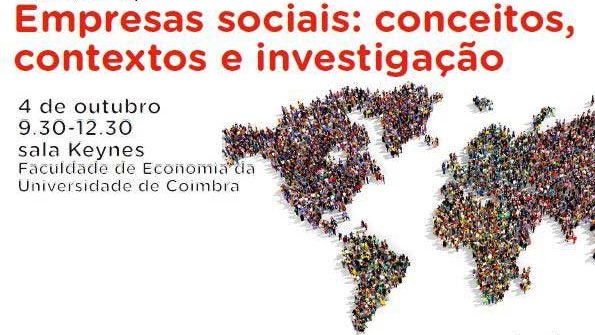The workshop “Social Enterprises: Concepts, Contexts and Research” was co-organized by the TIMES Project and CECES – Center for Cooperative and Social Economy Studies, in October 4th, 9.30-13.00, at FEUC.
This workshop aimed to discuss approaches to the concept of social enterprise from national and international resea rch experiences, evolving researchers who have worked on the concept of social enterprise or other concepts such as social economy, solidarity economy, social entrepreneurship and social innovation.
rch experiences, evolving researchers who have worked on the concept of social enterprise or other concepts such as social economy, solidarity economy, social entrepreneurship and social innovation.
The workshop started with a presentation by Sílvia Ferreira (TIMES / CES) on the objectives of the workshop and she introduced the participants. She highlighted the current relevance of the concept of social enterprise in Portugal, particularly as a result of European policies such as the Social Business Innitiative and the European Structural Funds in Portugal2020.
Two lectures on social enterprises in Portugal and Denmark and Europe followed.
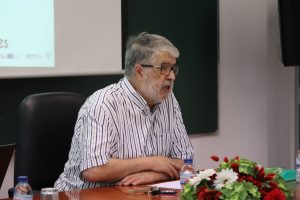 Rui Namorado, coordinator and researcher of CECES, and specialist on cooperativism and social economy, reported on the main debates around the concept of social enterprise in Portugal, with reference to the debate during the negotiation of the Framework Law of the Social Economy. Rui Namorado said that the agenda of social enterprises is imposed on Portugal by the European Commission, and may have the effect of preventing the affirmation of the social economy as an autonomous area. Thus, the agenda of the social enterprise has as a consequence the capture of funds that should be used by the OES, and this is expressed in the framework of public procurement.
Rui Namorado, coordinator and researcher of CECES, and specialist on cooperativism and social economy, reported on the main debates around the concept of social enterprise in Portugal, with reference to the debate during the negotiation of the Framework Law of the Social Economy. Rui Namorado said that the agenda of social enterprises is imposed on Portugal by the European Commission, and may have the effect of preventing the affirmation of the social economy as an autonomous area. Thus, the agenda of the social enterprise has as a consequence the capture of funds that should be used by the OES, and this is expressed in the framework of public procurement.
It is, as he says, of the adequacy to certain legal frameworks that are not those of the Portuguese case. Hence the need to recognize the autonomy of each State in this matter.
Namorado argues that the social economy is a constitutional sector (the cooperative and social sector), conceived, protected and consecrated as different from the public and private sector. Those are the social enterprises, the social economy enterprises.
He asserts that it makes no sense to include profitable enterprises in social enterprises and to exclude some organizations of the social economy. If social entrepreneurs want to create initiatives the corporate form is not the most appropriate. Moreover, since social enterprises are subaltern in the capitalist context, they should not be separated from the social economy in order not to be unprotected.
Rui Namorado recognizes that it is necessary to make changes to the Framework Law of the Social Economy to cover realities that may have been excluded, new social realities in need of new legal forms. Moreover, it is not clear in the Portuguese legislation what companies are: are they a subject? An object? An activity?
 Lars Hulgård, professor at the University of Roskilde (Denmark) and a specialist in social enterprises, spoke about policies to support social enterprises in Denmark and on the European concept of social enterprises, both within the framework of the EMES International Research Network approach and the the European Commission.
Lars Hulgård, professor at the University of Roskilde (Denmark) and a specialist in social enterprises, spoke about policies to support social enterprises in Denmark and on the European concept of social enterprises, both within the framework of the EMES International Research Network approach and the the European Commission.
Hulgard reviewed the emergence of the concept of social enterprise and how it has been institutionalized over the course of 20 years. Between 1991 and 1996 there were only 6 publications with the concept of social entrepreneurship, today there is a strong institutionalization in both research and policy. However, he points out that this concept, like others, is still being worked on by researchers and that it may have the same future as other concepts that were popular, that is, disappear from the agenda. However, organisations such as cooperatives will remain.
He then presented the social enterprise approach of the EMES network, of which he was co-founder, highlighting the economic, social and governance dimensions. Notes that there is convergence in relation to the European Commission’s social enterprise approaches, in particular as regards the operational definition. By adopting this definition the EC is a pioneer in opening the field to companies that are managed in a democratic and transparent way.
Referring to the case of Denmark, Hulgard referred to a set of measures such as the law on social enterprises in 2014, a national council of social enterprises, the Growth Center of Social Enterprise and a registered trademark for social enterprises. However, with a new right-wing government in 2015, all initiatives to build an ecosystem for social enterprises were terminated and the support center was closed for lack of funding.
The researcher ends up reflecting that social enterprises are the weakest part and it is necessary to consider the need for real institutional power.
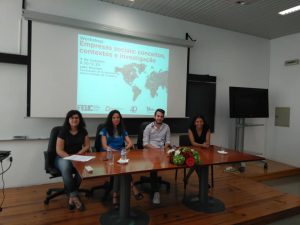 The presentation of four ongoing research projects at the Center for Social Studies followed. Each of these projects works from different, but neighborhood, concepts and is related to nearby empirical realities: social enterprise, solidarity economy, social innovation and social movements.
The presentation of four ongoing research projects at the Center for Social Studies followed. Each of these projects works from different, but neighborhood, concepts and is related to nearby empirical realities: social enterprise, solidarity economy, social innovation and social movements.
Joana Almeida, researcher at the CES, presented the project TIMES – Institutional Trajectories and Models of Social Enterprise in Portugal, coord. Silvia Ferreira, financed by the ERDF, COMPETE / FCT.
Beatriz Caitana, CES researcher and FEUC doctoral student, presented the project URBINAT – Healthy corridors as drivers of social housing neighborhoods for the co-operation of social, environmental and marketable NBS, coord. Gonçalo Canto Moniz, and funded by the European Commission.
Fábio Sampaio, CES fellow and FEUC doctoral student presented the project Atlântic Social Lab – Atlantic Cooperation for the promotion of social innovation, coord. Hugo Pinto, EU-funded INTERREG Atlantic Area (INTERREG Atlantic Area)
Michela Giovannini, CES postdoc researcher, presented the AGORA project – Alternative Grassroots Organizations as a Response to Austerity: perspectives from Southern Europe, European Commission (Marie Sklodowska-Curie individual Fellowships European)
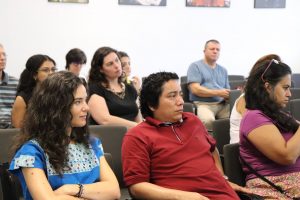 The workshop closed with a round of debate by the invited participants, mostly CES and CECES researchers.
The workshop closed with a round of debate by the invited participants, mostly CES and CECES researchers.
Monica Lopes, researcher at CES, a specialist in the evaluation of third sector organizations, reported on the growing importance of impact assessment for social innovation and social enterprises, to mention that evaluation is a socially constructed process and not a neutral instrument. As such, the different conceptions surrounding the concept of social enterprise and other concepts have an impact on the way in which evaluation is conceived and on the financing criteria themselves. She says that once new actors and financing logics, such as the value-for-money logic, come into play, this will have an impact on the identity of the third sector and its characteristics.
Andres Sponardi, CES researcher and postdoc, specialist in cooperatives and Latin America, has been studying industrial companies self-managed by workers in Spain and Portugal, namely cooperatives in Portugal and labor cooperatives and labor societies in Spain . All can be considered social enterprises.
He states that labor societies are different from cooperatives, in that they are constituted 50% by workers and 50% by capitalist investors, the internal logic of labor societies being very different from cooperatives.
He questions the extent to which the concept of social enterprise really helps us to perceive reality better, and if it does not belong only to the phenomenon of inflation of concepts of the last years, including the circular economy, the civic economy, the collaborative economy, etc.
Elisabete Ramos, researcher at CECES / FEUC, specialist in corporate law and cooperatives, refers to the plurality of meanings of social enterprise in the EU institutions, and that there is no act aimed at harmonizing or standardizing social enterprises. There are many reports and study documents, a lot of soft law, but not binding documents where there is a characterization of social enterprises. This means t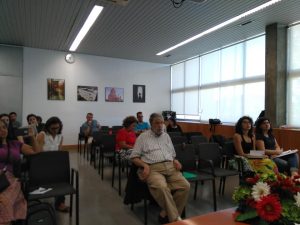 hat member states retain the freedom to legislate on social enterprises.
hat member states retain the freedom to legislate on social enterprises.
At the level of the member states there is a great diversity of legislation, with some countries that have already advanced with norms and laws on SE and others not. This diversity is also present in the diversity of specific legal forms, but the most interesting is the hybridity of these forms. Many of these forms come from societies.
Elisabete Ramos considers that this is a phenomenon to stay.
In Portugal we have a Framework Law of Social Economy, but we do not have a legal form for social enterprise. In section h) of the Framework Law are all the contradictions and trends that we have talked about, and hence what is not yet clarified. However, it can accommodate such social enterprises, when these are legally defined.
Patrícia Moura e Sá, researcher at CECES / FEUC, specialist in quality, emphasized the contribution of quality to a responsible, transparent and innovative management that involves the stakeholders.
She also points out that quality models contribute to building trust in organizations, as it allows us to believe that what is done obeys a certain type of rules.
In addition, quality models contribute to the evaluation because they help to measure results. Taking into account that not all quality benchmarks are appropriate for social enterprises, Patricia Moura e Sá points to the importance of a mission-focused assessment that allows the identification of indicators to verify whether the organization is actually doing what it states in the mission.
Eber Quinonez, doctoral student at FEUC and member of ECOSOL / CES, brings the vision of the solidarity economy and, above all, the short circuits of production and distribution, which are the focus of his research work. He argues that there is a very strong emphasis on initiatives that are developed in urban areas and less attention to initiatives in the rural world. It also advocates a dialogue between urban and rural initiatives on issues such as food.
Margarida Antunes, researcher at CECES / FEUC and specialist in employment economics, criticizes the political approach to employment / unemployment in which employment is not conceived as a macroeconomic problem but as a problem of the individual.
Governments lack responsibility for job creation and give this responsibility to other entities. The discourse includes the idea that local governance, third sector organizations or local authorities are the best way to solve this problem, which is actually macroeconomic.
On the theoretical basis is a neoclassical conception in which the wage is seen as a relation of the market, the work a commodity and cost of production. The organisations of the social area, including social enterprises, end up being conniving with these conceptions.
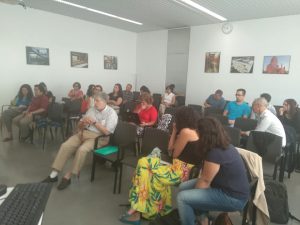 The workshop ended with the participation of other participants, who pointed out, for example, some current issues about Social Solidarity organisations, such as their relationship with the State, the deficient supervisory role of the state, and the working conditions in these organisations. There was also an allusion to the idea of financial dependence of social economy organizations when compared, for example, with banks during the crisis.
The workshop ended with the participation of other participants, who pointed out, for example, some current issues about Social Solidarity organisations, such as their relationship with the State, the deficient supervisory role of the state, and the working conditions in these organisations. There was also an allusion to the idea of financial dependence of social economy organizations when compared, for example, with banks during the crisis.
The workshop ended with the idea, stated by Rui Namorado, that in social enterprises or social economy is the possible future of the planet.

